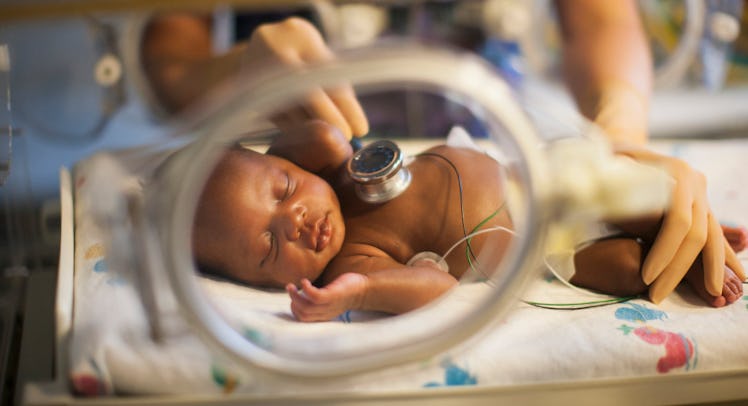Premature Babies At Greater Risk For Mental Health Issues
Scientists suspect that their stress responses are rewired early on.

Babies born prematurely may be at greater risk of developing mental health problems later in life, a new study suggests. Researchers found that preemies, due to their shorter gestations, may be more sensitive to bullying and other stressors that are proven risk factors for certain mental illnesses.
“We weren’t sure if their risk for anxiety and depression in adulthood was due to the fact that they simply were exposed to more bullying, abuse and stressors like that,” study coauthor Ryan Van Lieshout, a psychiatrist and professor of psychiatry at McMaster University, told Fatherly. “Or if it was that the effect of each of those things was amplified by being born preterm.”
The World Health Organization estimates that 15 million babies—about 1 in 10—are born prematurely, and that nearly one million die as a result. For the premature infants that survive, scientists suspect that their elevated risk of psychiatric problems later in life has something to do with how their neural systems developed in the womb. At the same time, some experts argue that premature infants are simply be exposed to more stress as young children (bullying for their small stature, perhaps) and that this, not some neurological wiring, leads to mental health issues.
Van Lieshout and colleagues resolved to resolve this debate by comparing data from 142 extremely low-birth-rate infants (less than 2 pounds and 3 ounces at birth) to 113 term babies. They then followed these children into their twenties and monitored outside risk factors of mental illness, including family dysfunction, overprotective parenting, criminality in parents, physical or sexual abuse, and peer victimization or bullying. The results confirmed that “extremely low-birth-rate survivors were not exposed to more risks,” Van Lieshout says. And yet, premature babies ranked higher than average on the Young Adult Self-Report, a scale that calculates how much psychopathology children internalized growing up. In other words, they were exposed to roughly the same stressors as everyone else—but they were far more likely to be harmed by these stressors.
Van Lieshout suspects this amplified risk has something to do with the stressors pregnant mothers are often exposed to that lead up to early delivery, or the medical interventions that are often needed to save their lives. “We think that this probably reprograms their body and brain’s stress responses,” he says. There may also be a connection between brain development and susceptibility to stress.
It’s important to note that all of the babies tracked in this study were Canadian and had access to universal healthcare, which somewhat limits the applicability of the findings in the U.S. Though one could assume the implications would be worse, Van Lieshout could not confirm this. In addition to looking at broader samples of infants, he recommends future studies expand resilience measures to include formal interventions, such as family therapy and psychotherapy, to see if that mitigates risk.
Until then, the most important takeaway for parents is to remember to take care of their own stress, Van Lieshout says. “Babies born prematurely have a lot of physical health problems and that can be very stressful for parents,” he says. “It’s very important for them to get as much support as they can from family, friends, and professionals and that they get the help they need in their struggle.”
This article was originally published on